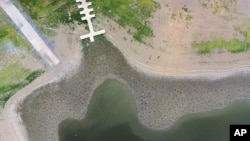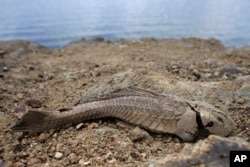The most severe drought to hit the Caribbean in recent years is expected to worsen despite rains from tropical storms that have replenished some reservoirs.
Forecasters say the El Nino phenomenon is gathering strength and will continue to warm the tropical Pacific until early next year, which translates into sparse rainfall for this largely parched region as the dry season approaches.
"The real concern will come late in the year,'' said Adrian Trotman, a forecaster with the Caribbean Institute for Meteorology and Hydrology. "We are definitely in a period of relief, but it's quite likely the relief will not be as long-lived as we would like it to be.''
The El Nino has produced a quiet hurricane season, which begins in June and ends in November. Only two of nine named storms dumped significant rainfall over parts of the Caribbean.
The institute issued a report this month saying that many islands in the eastern Caribbean remain in drought, and officials warned that the current wet season will most likely end before the traditional date of November 30.
Both Barbados and Grenada had their third-lowest rainfalls in recent history for August, while Haiti saw up to a 50 percent loss in crops in the hardest-hit areas, according to a report from the International Monetary Fund.
The neighboring Dominican Republic saw its agricultural production drop nearly 11 percent as a result of drought, and dairy industry officials have warned that production could drop 30 percent by year's end.
Jamaica also has struggled with crop losses, especially in the island's eastern region.
"They are suffering terribly,'' said Leslie Simpson, a specialist with the Caribbean Agricultural Research and Development Institute. "It's really going to be more serious as we go into the dry season, not only for agriculture but for domestic consumption.''
Some islands, including the Bahamas and Cuba, have had some relief in recent months, and more rain is forecast for them than anywhere else in the Caribbean in the coming months.
Severe drought also has ebbed somewhat in Puerto Rico, where officials this week eased austere water-rationing measures. However, 19 percent of the island remains under an extreme drought and 45 percent more is under a severe one.
The Caribbean Agricultural Research and Development Institute is encouraging farmers to find new irrigation methods and better manage existing resources.
"They are predicting more frequent droughts,'' Simpson said. "This is just the beginning.''





